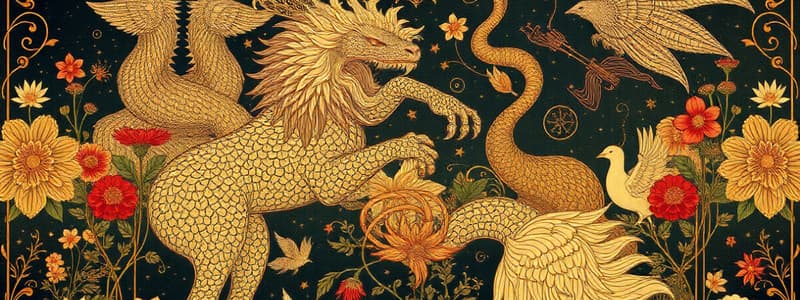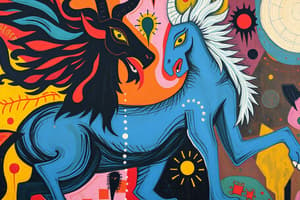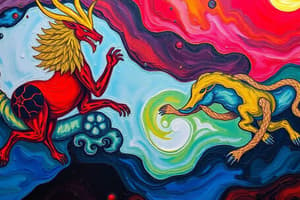Podcast
Questions and Answers
A society attributes the changing of the seasons to a yearly battle between two powerful deities. Which function of myth does this BEST exemplify?
A society attributes the changing of the seasons to a yearly battle between two powerful deities. Which function of myth does this BEST exemplify?
- Justifying social customs.
- Explaining natural phenomena. (correct)
- Preserving historical accuracy.
- Teaching moral lessons.
Which characteristic is MOST typical of legends compared to myths?
Which characteristic is MOST typical of legends compared to myths?
- Legends are primarily concerned with explaining the origins of the universe.
- Legends often involve gods and goddesses influencing human affairs.
- Legends are usually set in a remote, primordial past, disconnected from human history.
- Legends often highlight the actions and achievements of human heroes in a historical context. (correct)
How do myths primarily differ from legends in their treatment of time?
How do myths primarily differ from legends in their treatment of time?
- Myths are usually set in a remote past, often before recorded history, whereas legends are set in a more recent historical period. (correct)
- Myths frequently alternate between past, present, and future, while legends maintain a strict chronological order.
- Myths disregard time altogether, focusing on abstract concepts, while legends are meticulous about historical timelines.
- Myths are set in the present, offering immediate lessons, while legends focus on future possibilities.
In what way do myths and legends MOST commonly overlap?
In what way do myths and legends MOST commonly overlap?
If a story explains how a culture's specific social hierarchy came to be, and features a human founder, is this MOST likely a myth or a legend?
If a story explains how a culture's specific social hierarchy came to be, and features a human founder, is this MOST likely a myth or a legend?
Which of the following scenarios BEST illustrates how a real historical event could evolve into a myth?
Which of the following scenarios BEST illustrates how a real historical event could evolve into a myth?
A remote village passes down a story about a hero who saves them by defeating a dragon. Which element would classify this story as a legend rather than a myth?
A remote village passes down a story about a hero who saves them by defeating a dragon. Which element would classify this story as a legend rather than a myth?
Why might scholars study myths to understand a specific culture?
Why might scholars study myths to understand a specific culture?
Flashcards
What is a Myth?
What is a Myth?
Narrative explaining a culture's worldview, often involving supernatural elements.
Myth Definition
Myth Definition
Traditional stories explaining a people's origins, customs, or ideals.
Myth Characters
Myth Characters
Gods, goddesses, heroes, or supernatural beings are often involved.
Myth Purpose
Myth Purpose
Signup and view all the flashcards
What is a Legend?
What is a Legend?
Signup and view all the flashcards
Myth Timeframe
Myth Timeframe
Signup and view all the flashcards
Legend Timeframe
Legend Timeframe
Signup and view all the flashcards
Myth vs. Legend
Myth vs. Legend
Signup and view all the flashcards
Study Notes
- Narrative explaining a culture’s worldview's fundamental elements, often involving supernatural aspects.
- Traditional stories explaining a people's worldview, origins, customs, or ideals.
- Frequently feature gods, goddesses, heroes, or supernatural beings.
- Typically address fundamental questions about the universe, humanity, and morality.
- Fulfill various roles, from explaining natural phenomena to justifying customs and teaching morals.
- Often part of an oral tradition, passed down through generations verbally.
- Colloquially, "myth" can refer to a widely held but false belief. -Studying myths provides insights into different cultures' beliefs, values, and social structures.
Myths vs. Legends
- Myths recount events in a primordial past, often before human understanding of time.
- Legends narrate human actions perceived to occur within human history.
- Legends often recount the deeds of believed-to-be historical heroes and heroines.
- Myths generally involve gods, creation, supernatural events and explain natural phenomena or cultural practices.
- Legends tend to explain a group's identity and place in history.
Key Differences
- Myths focus on explaining the unexplainable, like the origins of the world or the nature of gods.
- Legends focus on recounting human heroes' deeds.
- Myths typically occur in a remote past, whereas legends are usually set in a more recent historical period.
- Myths tend to be pan-cultural or universal, addressing fundamental questions about the human condition.
- Legends often are specific to a particular culture or region, reflecting unique history and traditions.
- Myths can have multiple versions through oral tradition.
- Legends often have a more fixed form, associated with specific historical figures or events.
Overlap and Ambiguity
- Distinction between myth and legend isn't distinctly clear.
- Some stories have elements of both.
- Certain myths could originate from embellished historical events.
- Some legends might incorporate mythical elements to improve narrative.
- Classifying a story as myth or legend depends on the teller or interpreter's perspective.
Studying That Suits You
Use AI to generate personalized quizzes and flashcards to suit your learning preferences.
Description
Explore the nature and function of myths as narratives explaining cultural worldviews. Myths often involve supernatural elements and address fundamental questions. Study of myths provides insights into beliefs and social structures.




